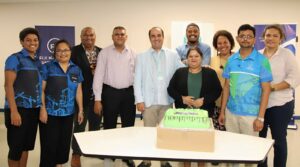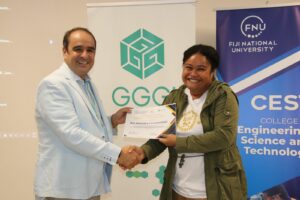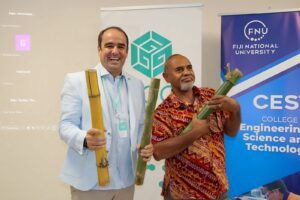SUVA, FIJI, 26 May 2023 – One-hundred Twenty Fijian stakeholders completed training that supports implementation of the Sustainability Chapter to the Fiji National Building Code (FNBC). The Sustainability Chapter, supported by GGGI and adopted in March 2022, includes guidance for incorporating climate mitigation, adaptation, and resilience in the building stock of Fiji. It also provided recommendations to building features for enhancing inclusion and wellbeing of occupants. The Sustainability Chapter serves as the green building code for Fiji, mainstreaming climate change considerations in the design, construction, and operation of buildings. To support the wide adoption of the concepts over 120 industry professionals and government officials participated in three-day green buildings training to boost capacities to apply green building techniques that can deliver both mitigation and adaptation benefits, as well as resource efficiency (water-energy), for the construction sector.
The training was organized by the Global Green Growth Institute (GGGI), with support from New Zealand’s Ministry of Foreign Affairs and Trade (MFAT), in partnership with Fiji’s Ministry of Public Works, Transport and Meteorological Services (MPWTMS) and Fiji National University (FNU). The activity supports the implementation of the new, still to be adopted, building code in Fiji, and the Climate Change Act adopted in September 2021.
The training raised awareness among relevant industry stakeholders to concepts of green passive design, as well as strategies for climate proof buildings. Event participants included building designers, building services, engineers, local authorities, and town and country planning stakeholders.
Fiji National University (FNU) has institutionalized the training material and will continue to deliver trainings to address the high demand on this by the industry. The material covers building energy efficiency, building orientation and site planning, material performance, selection and placement, water management, waste management, resilience and household energy efficiency.
 GGGI is supporting this work under its MFAT-funded Low Emissions Climate Resilient Development (LECRD) program and has complemented this technical assistance with other relevant policy inputs and implementation tools, such as the Sustainability Chapter for the building code, a green buildings score card, the supplementary-green home builder´s manual and upcoming communication materials targeted to increase the resiliency of homes.
GGGI is supporting this work under its MFAT-funded Low Emissions Climate Resilient Development (LECRD) program and has complemented this technical assistance with other relevant policy inputs and implementation tools, such as the Sustainability Chapter for the building code, a green buildings score card, the supplementary-green home builder´s manual and upcoming communication materials targeted to increase the resiliency of homes.
“GGGI is pleased to continue supporting Fiji government and the local industry, as well as the academic community, to progress these measures into tangible and transformative implementation,” said Mr. Miguel Londoño, LECRD Program Manager at GGGI. “Discussions and suggestions generated from these trainings will help guide follow-up initiatives working to identify resilient and affordable structural materials that can deliver reduced costs for housing and other critical infrastructure, improve the resiliency of buildings in the face of extreme weather events”.
 Previous green buildings training engaged participants from communities including teachers, local homeowners, traditional carpenters and builders, resource owners and local authorities.
Previous green buildings training engaged participants from communities including teachers, local homeowners, traditional carpenters and builders, resource owners and local authorities.
About the LECRD
The LECRD program is a regional collaboration between GGGI, the New Zealand Ministry of Foreign Affairs and Trade, and targeted Pacific Island Countries (PICs), to support them to develop policy, legislation, regulations, standards, strategies, roadmaps, and investment plans that create an enabling environment for increased green investment and impactful climate action.
For queries, please contact Mr. Miguel Londoño, LECRD Program Manager. miguel.londono@gggi.org